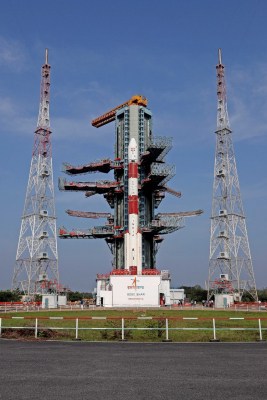By Venkatachari Jagannathan
Sriharikota (Andhra Pradesh), Dec 17 : India on Thursday successfully placed its 42nd communication satellite CMS-01 (formerly GSAT-12R) in the geosynchronous transfer orbit in a textbook style.
India’s brand new communication satellite CMS-01 with a life span of seven years will provide services in Extended-C Band of the frequency spectrum. The satellite will cover Indian mainland, Andaman and Nicobar and Lakshadweep Islands, said Indian Space Research Organisation (ISRO), the country’s space agency.
The CMS-01 will be a replacement for GSAT-12 that weighed 1,410 kg and was launched on July 11, 2011 with a mission life of eight years.
Expressing his happiness at the successful launch of CMS-01 satellite, ISRO Chairman K.Sivan said: “In four days time the CMS-01 satellite will be taken to its intended geosynchronous orbit. The satellite’s solar panel has been deployed.”
He said the next rocket that would fly in Feb-March 2021 will be PSLV-C51 which will be a special one for ISRO as well as for the country.
Sivan said the rocket will be carrying India’s first earth observation satellite from a start-up called Pixxel. The rocket will also carry communication satellite built by students part of SpaceKidz team and another satellite built by consortium of three Indian universities.
“The primary payload for PSLV-C51 rocket will be a Brazilian satellite weighing between 600-700kg,” Sivan told IANS.
He also said Team ISRO has a busy schedule ahead with the launch of Aditya satellite, Gaganyaaan-India’s human space mission, realisation of small rocket Small Satellite Launch Vehicle (SSLV).
The Thursday space mission is second and last from this rocket port and third for the country this year.
On November 7, ISRO launched radar imaging satellite EOS-01 (Earth Observation Satellite-01, formerly RISAT-2BR2) and nine foreign satellite for a fee with a PSLV rocket.
Earlier on January 17, 2020, ISRO launched 3,357 kg communication satellite GSAT-30 by the European space agency Arianespace rocket Ariane 5.
Further, CMS-01 is the first communication satellite that ISRO has orbited under its new satellite naming scheme.
ISRO has recently decided to go generic in naming its satellites. It had earlier named its earth observation satellites as EOS and the communication satellites are being named as CMS.
“Nowadays satellites have multiple payloads for varied users and hence a thematic satellite may be a misnomer and ISRO might have decided to go for a generic name,” M. Annadurai, who retired as Director, U.R. Rao Satellite Centre (URSC), formerly ISRO Satellite Centre, had told IANS.
Be that as it may, at about 3.41 p.m. the 320 tonne-PSLV-C50 rocket blasted off from the second launch pad here and slowly rose-up towards the skies with thick orange flame at its tail.
The rocket slowly gained speed as it went up while emitting a rolling thunder sound.
About 20 minutes into its flight, the PSLV-C50 rocket ejected CMS-01 into geosynchronous transfer orbit (GTO) and from there, the satellite will be taken up and positioned at geosynchronous orbit.
The Indian space agency had earlier planned the maiden launch its new small rocket Small Satellite Launch Vehicle (SSLV) carrying EOS-02 (Earth Observation Satellite), and Geosynchronous Satellite Launch Vehicle-F10 (GSLV) carrying EOS-3 before the close of 2020.
The other Indian satellites that are ready for launch are GISAT and Microsat-2A.
The launch of the GISAT-1 satellite slated for March 5 this year was postponed due to technical reasons a day before the launch.
The GISAT-1 satellite will be carried by a GSLV rocket. The GSLV rocket was dismantled after the launch was called off and is being refurbished. The rocket’s cryogenic engine has been brought down and it is being readied again.
But they all will have to wait for the dawn of 2021.
(Venkatachari Jagannathan can be contacted at v.jagannathan@ians.in)
Disclaimer: This story is auto-generated from IANS service.

